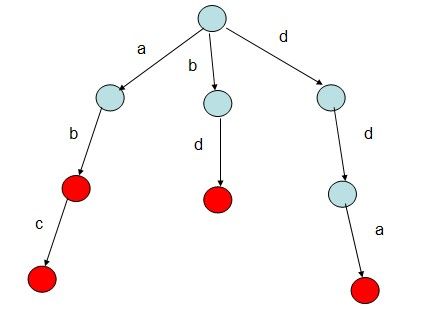Trie 树
看了很多 Trie 树的介绍, 这篇讲的最好,简单易懂(特别是代码部分),直接转载:http://www.cnblogs.com/dolphin0520/archive/2011/10/11/2207886.html
Trie树也称字典树,因为其效率很高,所以在在字符串查找、前缀匹配等中应用很广泛,其高效率是以空间为代价的。
一.Trie树的原理
利用串构建一个字典树,这个字典树保存了串的公共前缀信息,因此可以降低查询操作的复杂度。
下面以英文单词构建的字典树为例,这棵Trie树中每个结点包括26个孩子结点,因为总共有26个英文字母(假设单词都是小写字母组成)。
则可声明包含Trie树的结点信息的结构体:
1 #define MAX 26 2 3 typedef struct TrieNode //Trie结点声明 4 { 5 bool isStr; //标记该结点处是否构成单词 6 struct TrieNode *next[MAX]; //儿子分支 7 }Trie;
其中next是一个指针数组,存放着指向各个孩子结点的指针。
如给出字符串"abc","ab","bd","dda",根据该字符串序列构建一棵Trie树。则构建的树如下:

Trie树的根结点不包含任何信息,第一个字符串为"abc",第一个字母为'a',因此根结点中数组next下标为'a'-97的值不为NULL,其他同理,构建的Trie树如图所示,红色结点表示在该处可以构成一个单词。很显然,如果要查找单词"abc"是否存在,查找长度则为O(len),len为要查找的字符串的长度。而若采用一般的逐个匹配查找,则查找长度为O(len*n),n为字符串的个数。显然基于Trie树的查找效率要高很多。
但是却是以空间为代价的,比如图中每个结点所占的空间都为(26*4+1)Byte=105Byte,那么这棵Trie树所占的空间则为105*8Byte=840Byte,而普通的逐个查找所占空间只需(3+2+2+3)Byte=10Byte。
二.Trie树的操作
在Trie树中主要有3个操作,插入、查找和删除。一般情况下Trie树中很少存在删除单独某个结点的情况,因此只考虑删除整棵树。
1.插入
假设存在字符串str,Trie树的根结点为root。i=0,p=root。
1)取str[i],判断p->next[str[i]-97]是否为空,若为空,则建立结点temp,并将p->next[str[i]-97]指向temp,然后p指向temp;
若不为空,则p=p->next[str[i]-97];
2)i++,继续取str[i],循环1)中的操作,直到遇到结束符'\0',此时将当前结点p中的isStr置为true。
2.查找
假设要查找的字符串为str,Trie树的根结点为root,i=0,p=root
1)取str[i],判断判断p->next[str[i]-97]是否为空,若为空,则返回false;若不为空,则p=p->next[str[i]-97],继续取字符。
2)重复1)中的操作直到遇到结束符'\0',若当前结点p不为空并且isStr为true,则返回true,否则返回false。
3.删除
删除可以以递归的形式进行删除。
测试程序:
1 #include <iostream> 2 #include <cstdlib> 3 #include <stdio.h> 4 #define MAX 26 5 using namespace std; 6 7 typedef struct TrieNode 8 { 9 bool isWord; 10 struct TrieNode *next[MAX]; 11 }Trie; 12 13 void insert(Trie *root, const char *s) 14 { 15 if(root == NULL || (*s) == '\0') 16 return; 17 Trie *p = root; 18 int i; 19 while((*s) != '\0') 20 { 21 if(p->next[(*s) - 'a'] == NULL) 22 { 23 Trie *temp = (Trie *)malloc(sizeof(Trie)); 24 for(i = 0; i < MAX; ++i) 25 { 26 temp->next[i] = NULL; 27 } 28 temp->isWord = false; 29 p->next[(*s) - 'a'] = temp; 30 p = p->next[(*s) - 'a']; 31 } 32 else 33 { 34 p = p->next[(*s) - 'a']; 35 } 36 s++; 37 } 38 p->isWord = true; 39 } 40 void del(Trie *root) 41 { 42 int i; 43 for(i = 0; i < MAX; ++i) 44 { 45 if(root->next[i] != NULL) 46 { 47 del(root->next[i]); 48 } 49 } 50 free(root); 51 } 52 53 int search(Trie *root, const char *s) 54 { 55 Trie *p = root; 56 while(p != NULL&&*s != '\0') 57 { 58 p = p->next[(*s) - 'a']; 59 s++; 60 } 61 return (p != NULL && (p->isWord == true)); 62 } 63 int main() 64 { 65 int i; 66 int n,m; 67 char s[100]; 68 Trie *root = (Trie *)malloc(sizeof(Trie)); 69 for(i = 0; i < MAX; ++i) 70 { 71 root->next[i] = NULL; 72 } 73 root->isWord = false; 74 scanf("%d",&n); 75 getchar(); 76 for(i = 0; i < n; ++i) 77 { 78 scanf("%s",s); 79 insert(root, s); 80 } 81 while(scanf("%d",&m)!=EOF) 82 { 83 for(i = 0; i < m; ++i) 84 { 85 scanf("%s",s); 86 if(search(root, s)) 87 { 88 printf("Yes, find it!\n"); 89 } 90 else 91 { 92 printf("No, loss it!\n"); 93 } 94 } 95 } 96 del(root); 97 return 0; 98 }